|
By CHAN Chin Wang Erwin (Year 3, Psychology)
Last summer, I am so honoured to have my two-week studies in University Utrecht, the biggest and internationally highest ranked university in the Netherlands.
The course I enrolled in was ‘European Culture and Identity’. I chose this course because of three reasons. It was my first time to visit Europe, therefore I believed that this course is a good offer to a student unfamiliar with European studies. Moreover, I hoped this course would be related to my major studies, which is Psychology. Culture and identity are the basic elements in shaping a person, as well as how one thinks and how one acts. Last but not least, international relationship is getting more important nowadays; I hoped I could understand more about the globe from a European perspective.
I could explore European culture from multi perspectives. We had a field trip to Amsterdam in one of the school days. We visited Rijksmuseum (Dutch National Museum) and Hermitage Amsterdam, which are the largest and most popular art museums in the Netherlands. Especially in the National Museum, I could even see the real pieces of artwork and paintings from the famous painters, including Rembrandt and Vermeer. Although I was not an expert in art, I could feel the gorgeousness and sophistication from the painters. This was indeed one of the most unforgettable experiences in the trip.
What I did here was inspiring and meaningful. We were invited to tell the difference between our original perception of Europe and the one that we had experienced during our stay. The answers were all-rounded, ranging from language to weather, from table etiquette to public transports. In one of the afternoon seminars, we were divided into five groups, each representing a European country, and our role was to investigate some current political and social issues faced by those countries. I was representing the Spanish government, and raised my concerns about the problem of local unemployment, solutions to the Euro Debt Crisis in 2008, as well as refugees. We had heated debate and discussions in this seminar, and it helped us a lot by looking into different European countries from their perspectives. I would say it is rare to have opportunities like these in Hong Kong.
The social programmes offered many great chances to meet new friends, as well as to explore the country in a non-academic way. I enrolled in a programme called ‘Discover Holland Day’. Instead of visiting Amsterdam, the biggest and most populous city in the Netherlands, the discovery day had brought me to other cities, including Rotterdam and Gouda. During the day trip, I realized that many stereotypes I originally had of this country, such as cheese, milk, and windmills, were not as I thought. During a visit to a farm, we made our own cheese under the guidance of a farmer. Although the cheese I made was not as delicious as those I bought from the farm, I could at least have a taste in making one of the most famous food items in the Netherlands. Through visiting Kinderdijk near Rotterdam, my eyes were stunned by over 20 windmills in the park. I could not imagine I could get so close to so many windmills, as they were to me an element in fairy-tales. After taking some impressive photos of the windmills, I had a cup of coffee at a café, facing the scenic views of the windmills. It was absolutely worth the efforts travelling around these cities.
People would say that language is one of the biggest challenges when travelling overseas. Luckily, people in the Netherlands speak English fluently. Hence, I could communicate with them well. I was also very impressed with the level of support from both my home university and the host university. Before our departure, the College provided us with a lot of background information of the courses and the city, which helped us to get adapted. Most of the daily logistics were well prepared and well organized by both schools, including the phone cards, city maps, bus tickets, and transition from and to the airport. It had greatly minimized my worries when studying abroad. There was only one tiny difficulty I faced. As the city was not too big, instead of driving and taking public transports, people mostly ride their bikes when travelling around the city. I greatly appreciate their environmental friendly means of transport; however, I was once not aware of walking on a cycling path, and bikes almost crashed onto me. It taught me a lesson that cycling path and pedestrian roads were very different there.
People always say that having an exchange programme would allow one to be more independent. I think my experience was a bit different. Here, I have made many new friends, and we became dependent on each other. We not only travelled to other cities together, but also did our cooking most of the nights when we were at the hostel. Undoubtedly, it was different from my expectation. The city of Utrecht was full of historical buildings and cultural heritage; we observed that the city and the people do not ruin but preserve what they have. I had my lessons in the city centre, in the midst of many historical buildings. It shows that modern development and history can co-exist very well. I also found that things I have learned in this course really had practical use for my future. I gained a better understanding of how Europeans think of themselves, and investigated some hot issues in European countries. Although I was only studying in the Netherlands, it did not limit my view to this place. Instead, I can now look at different issues from different perspectives. It was very meaningful and unregretful to participate in this summer programme.
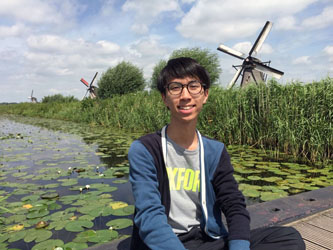 |
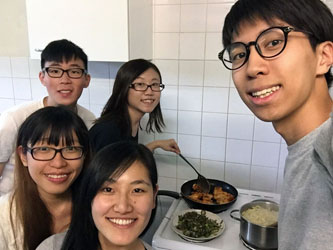 |
|
Erwin with the windmills
|
Erwin (right) cooking with friends at hostel |
 |
|
|
A visit to De Haar Castle
|
|
By CHAN Wang Fung Raphael (Year 3, Architectural Studies)
I studied the course ‘European Politics and Economy’ at Utrecht University for an intensive two weeks.
The course was offered by the Faculty of Humanities with its content centred around the European Union. Through understanding the history of its formation, current institutional structures, aims and future challenges, the idea of Europe is examined. Lectures were held every weekday morning and a total of 4 tutorial sessions were held in the afternoons. The suggested reading is informative and helps a lot in acquiring background information for discussions in class. Though two short essays and an exam were required, the workload was in my opinion not excessive. A one-day excursion with arranged transportation to Hague/Brussels was included in the package; students were taken to actual workplaces of European Union institutions. The institutional system of the EU is in fact very complex. Some say it is necessary, some say not; conversations with actual practitioners do help a lot and prevent a lot of opinionated judgements. We had weekends to ourselves, and I went to Amsterdam and Rotterdam by train. The dormitory is located at the new campus, De Utihof, at the street Cambridgelaan. It is a very modern building next to a sheep farm. One can play with the sheep as they graze. The new campus is quite far from the old campus, with a 10-minute bus ride. Fortunately, a bus ticket pass was provided free to students.
There were many memorable moments, from the chilly and unpredictable weather, the medieval cityscapes in Utrecht, to the famous professors or parliamentary members invited as guest speakers to lectures. Yet the most memorable one has to be watching the Euros football game. People had great national pride and held the game important regardless of age and gender.
One thing I am most impressed about is the study environment. Students are punctual, attentive to the lectures, enthusiastic in making a point during tutorials; but after class, they are just as relaxed and playful like every college student in the world. On a side note, cultural difference, be it intercontinental or simply within Europe, is one of the issues crucial in the course on topics like integration or immigration. The course has varied students and lecturers from across Europe and even around the globe; differences are not only studied as text in books and slides, but directly felt during and after class.
Dutch people are generally nice and willing to speak English to foreigners. Yet most of the signages are written only in Dutch, thus things like groceries shopping without local’s help may require ome intuition. Dutch is however very similar to German. Some say it is like an intermediate between English and German. In my case, I have some knowledge of German, and it actually helps a lot in guessing whether the toilet is a male or a female one. One piece of advice for asking directions is not to ask the elderly. Although they are extremely friendly and happy to help you, they usually answer back in a combination of Dutch and English, which is even harder for us to understand. So go ask the young.
One thing I especially appreciate is the Dutch’s awareness of waste reduction. Contrary to the huge amount of plastic bottles and aluminum cans dumped in Hong Kong, the Dutch use glass or high quality reusable bottles for packaging drinks. Although one has to pay more, the bottles are refundable upon return to the seller or the designated machines. Thanks to the convenience and monetary incentive, many are willing to cooperate, and many bottles can be successfully retrieved. Personally, as an architecture student, I can finally have the chance to walk through Dutch architecture and it is particularly exciting for me that the famous Schroeder House is located right at Utrecht. Whether one is an architecture student or not, I think it is good experience to go and have a look. Other than that, the stunning landmarks at Amsterdam and Rotterdam also offer some new insight of design possibilities.
For knowledge gained, it has to be the solid facts and information learned from the class and the recommended readings. With that knowledge I at least understand now how policies are made within the Union, for which I think many Europeans do not know themselves. The fact that one needs to take a university course or do extensive research in order just to get a glimpse on how the system works is one of the issues that would be discussed in class as well.
One skill I acquired from this experience is cooking pasta. Eating outside everyday would cost quite a fortune in Utrecht. Luckily raw ingredients like spaghetti, cheese and milk are exceptionally cheap compared to Hong Kong. (Bottled beer in crates is cheap as well.) Cooking is definitely recommended.
Furthermore, the programme offered a staying-behind option that allows you to delay the returning ticket by one to two weeks. I stayed behind for two weeks to travel to Germany. The experience was more than a mere trip, as it was an immediate realization of policies I had been learning in Utrecht about Europe. First of all, although I was crossing the country border between Germany and the Netherlands, there was no border control at all thanks to the Schengen agreement. Just like travelling to Amsterdam or Rotterdam, I went to the same train station and took a little longer train-ride; three hours later, I was in a different country, speaking a different language, eating the Currywurst and drinking the Koelsch Bier. Secondly, despite being in a different country, I was spending the same currency Euro to buy completely different goods, paying at different tax rates.
I would recommend students planning to take this course to do some preparation beforehand. In my opinion, understanding the formation of European Union requires prerequisite knowledge of European history. The idea of ‘Europe’ can be traced to antiquity. Empires, nations, republics, confederations, federations, ‘Union’, forming a long line of progression in many ways and sculpted many concepts and values of European nowadays. Although there is a brief introduction of its history in the course, extra preparation would definitely be advantageous. Reading books I think would be the best option; however, if one wants to keep it entertaining, watching documentaries on YouTube of famous wars and philosophies would also be good.
All in all, it was a memorable and precious experience for me, studying a different subject in an unfamiliar country. I would say I have grown up a bit more after this trip.
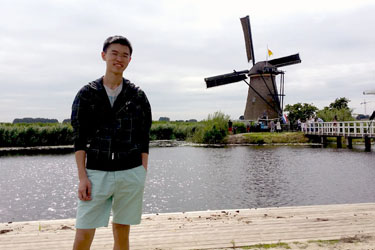 |
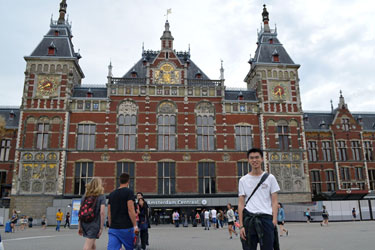 |
|
Raphael with a windmill at Kinderdijk
|
Amsterdam Central Station
|
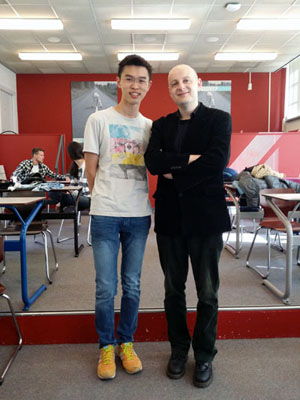 |
|
|
Raphael with course coordinator
|
|
|









